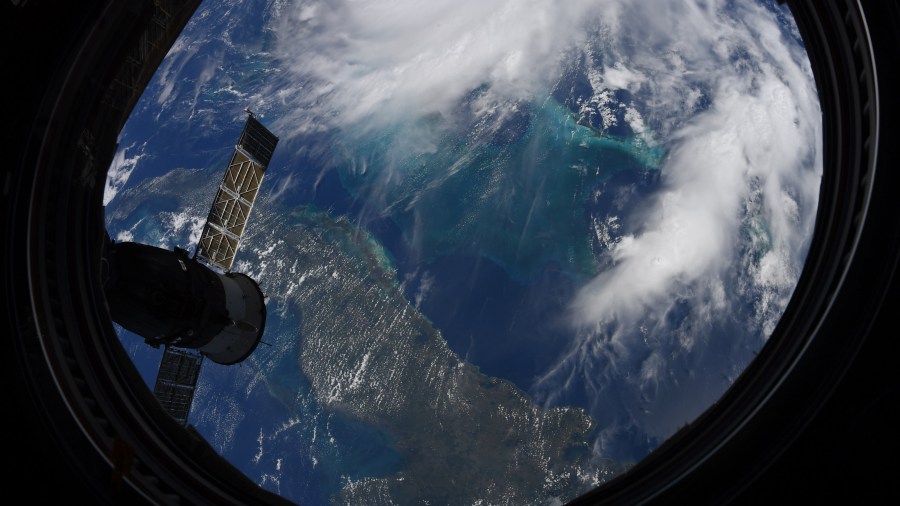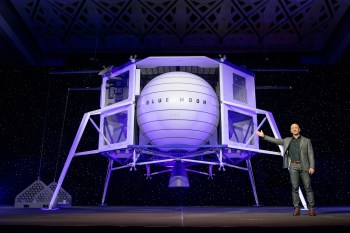Suit up! Civilian space travel is almost here.

A handful of companies out there plan to take rich thrill-seekers to the edge of space, and they’re ready to convince investors there’s money to be made. Virgin Galactic made its stock market debut on Monday. It’s offering suborbital rides for about $250,000, it’s first paying customers buying tickets for lift off as soon as 2020.
So is it going to get crowded up there? I turned to Jeff Hoffman, a former astronaut and now an MIT aeronautics professor, for some insights. He’s flown on the space shuttle five times. The following is an edited transcript of our conversation.
Jeff Hoffman: You definitely will get a real astronaut’s view of the world; you’ll be up where the sky is black; you’ll see the curvature of the Earth; you’ll see the very thin blue line, which is the true view of the Earth’s atmosphere. It’s not the big blue sky, which looks like it goes on forever when we see it on a nice sunny day. You’ll get an astronaut’s view of the world, and you’ll get an astronaut’s experience of weightlessness. Alas, it will be over before you know it, and you better get back in your seat because you’re ready for a several-G pullout as you reenter the atmosphere.
Jack Stewart: I was wondering if you could give us some of your predictions about where this might go. I feel like it would only take one accident for the industry to really suffer a setback — in excitement, at least.
Hoffman: If it happened early on, I think you’re probably right. But this is a new industry, and obviously safety is absolutely paramount, which is one reason why there’s been so many delays in getting things ready to go. The real thing that we don’t know is what’s the price demand curve? How many people are ready to shell out, basically, about a quarter of a million dollars for a flight into space?
Stewart: I know you’re particularly interested in how useful humans can be in space, but an awful lot can be done now with robotic systems. Is it really important to get people up into space, given the environmental concerns and everything else?
Hoffman: The most common question that I get when people find out that I’m an astronaut [and have] been in space, what they want to know is “What’s it like in space?” You can ask that question of a robot, and you’ll get lots of information about the temperature and the magnetic field and charged particle composition. But what people are really fascinated with is the human experience of being in space. That’s why people are willing to pay to go up in Virgin Galactic and Blue Origin for these short spaceflights. They want themselves to find out. I think there will be a future in that because I can tell you when the first travelers come back with their traveler’s tales about how incredible an experience it is, I hope that the result is that you won’t be able to keep people away.

Related links: More insight from Jack Stewart
As well as Richard Branson’s Virgin Galactic, Hoffman mentioned another member of the billionaire’s space club: Jeff Bezos’ Blue Origin. It’s also planning on offering trips to the edge of space. And Elon Musk’s SpaceX is getting ready to fulfill a commercial contract from NASA to get astronauts all the way to the International Space Station. Maybe one day there’ll be some spare seats for sale.
I recommend one particular page of a site that I got sucked into — be warned if you’re a space enthusiast, you’ll want to set aside a chunk of time — spacetourismguide.com.
Then jump over to Boeing’s official site for its Starliner space capsule page. Boeing is another company that is contracted by NASA to provide commercial astronaut trips, but which also might end up with spare seats to sell one day. There are details on everything from the autonomous docking procedure to the spacesuits the people on board will wear. And if you’re wondering who exactly the people are lining up with their quarter of a million dollars for a few minutes in space, so did reporters at the Washington Post.
The future of this podcast starts with you.
Every day, the “Marketplace Tech” team demystifies the digital economy with stories that explore more than just Big Tech. We’re committed to covering topics that matter to you and the world around us, diving deep into how technology intersects with climate change, inequity, and disinformation.
As part of a nonprofit newsroom, we’re counting on listeners like you to keep this public service paywall-free and available to all.
Support “Marketplace Tech” in any amount today and become a partner in our mission.





















